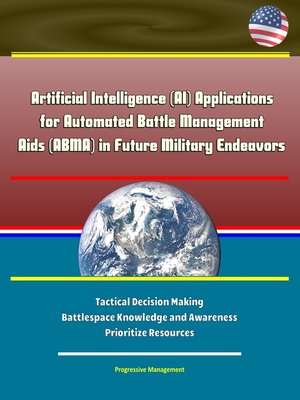Artificial Intelligence (AI) Applications for Automated Battle Management Aids (ABMA) in Future Military Endeavors--Tactical Decision Making, Battlespace Knowledge and Awareness...
ebook

Sign up to save your library
With an OverDrive account, you can save your favorite libraries for at-a-glance information about availability. Find out more about OverDrive accounts.
Find this title in Libby, the library reading app by OverDrive.



Search for a digital library with this title
Title found at these libraries:
| Loading... |
This report has been professionally converted for accurate flowing-text e-book format reproduction. This thesis seeks to study artificial intelligence (AI) technologies that can improve decision-making in complex military tactical environments. Tactical environments can become highly complex in terms of threats, the tempo of events, the element of surprise or unexpected events, the limits of battlespace awareness, and the potential deadly consequences. This type of environment translates into a highly challenging decision space for tactical warfighters. Tactical decision-making tasks quickly surpass the cognitive abilities of humans in terms of identifying decision options, weighing the relative value of numerous options, calculating the predictive success of options, and performing these tasks under extremely short timeliness. The Navy has identified the need to develop automated battle management aids (ABMA) to support human decision-makers. The concept is for ABMAs to process large amounts of data to develop battlespace knowledge and awareness and identify and prioritize warfare resource and course of action options. Recent developments in AI methods show promise as a critical enabler of ABMAs to support tactical decision-making. This thesis studies AI methods with an objective of identifying specific applications to the realm of tactical decision-making.
This compilation includes a reproduction of the 2019 Worldwide Threat Assessment of the U.S. Intelligence Community.
The Navy has identified a need to utilize and exploit the benefits of AI particularly in the realm of tactical decision-making. A growing number of sensors and networks are providing tactical commanders with an abundance of information. Tactical commanders must process an abundant amount of information and rely on their ability to disregard useless information and prioritize that which is relevant and actionable. Commanders are also constrained by timing and whether or not they have the correct information to make critical decisions that can present dire consequences. AI, through the implementation of ABMAs, provides a technology which can be used to assist commanders in processing information and making decisions. The utilization of AI needs to be studied and analyzed in order to be properly implemented into the battlespace to provide positive results to commanders. The purpose of this thesis is to better understand how existing and future AI methods can improve tactical decision-making. The benefits to the warfighter from this study include increased battlespace awareness, improved usage of warfighting resources, increased tactical advantages over adversaries, and increased decision superiority. The study explores how AI methods could specifically support the Navy's tactical missions. The study's objective is to support the Navy's development of ABMAs through increased knowledge.






